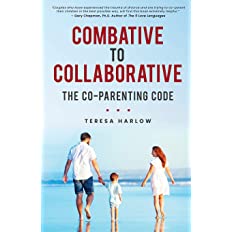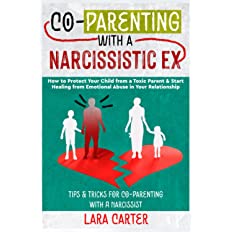Co-Parenting Made Easy: Understanding How Co-Parenting Works

Co-Parenting: Navigating the Challenges of Raising Children Together
Let’s face it, co-parenting can be a challenging way to parent in the 21st century. Essentially, both parties have to be on the same page, and the waters can become murky if good communication isn’t enforced. However, there is one crucial factor to consider when co-parenting: the children.

Combative To Collaborative: The Co-parenting Code
ACHIEVE CO-PARENTING SUCCESS AND RAISE HAPPY CHILDREN!
“This book is a true breakthrough for co-parents struggling to positively interact or who want to get it right from the beginning. I highly recommend it!”— Jack Canfield, Coauthor of the bestselling Chicken Soup for the Soul® series including Chicken Soup for the Parent’s Soul
In this post, we will explore what co-parenting is, how to do it effortlessly, the best co-parenting practices, how to co-parent with a difficult ex, the impact of good and bad co-parenting on children, what happens when co-parenting fails, and the benefits of co-parenting counseling.
What Is Co-parenting?
Co-parenting is the act of raising a child together after a separation or divorce has taken place. This means that both parents must work together to make decisions, set boundaries, and create a supportive and healthy environment for their children. Co-parenting can be a difficult process, challenging to say the least, as it involves ongoing communication and cooperation between both parties. However, if done correctly, co-parenting can lead to a more stable and nurturing environment for the child ultimately providing emotional fulfillment for both parents.
How To Co-Parent Effortlessly
Co-parenting can be a challenging task, but there are ways to make it more manageable. Here are a few tips to help you co-parent effortlessly:
- Keep communication open and honest: Good communication is the key to successful co-parenting. Be clear about your expectations and share information about your child’s well-being.
- Keep your child’s best interests in mind: Always make decisions with your child’s best interests in mind. This means putting your differences aside and working together to create a supportive environment for your child.
- Be flexible: Things can change quickly, and you may need to adjust your plans. Be open to compromise and work together to find a solution that works for everyone.
- Create a parenting plan: A parenting plan can help establish guidelines for co-parenting, including schedules, responsibilities, and rules.

Simple Modern 40 oz Tumbler with Handle and Straw Lid | Insulated Reusable Stainless Steel Water Bottle Travel Mug Iced Coffee Cup | Gifts for Women Men Him Her | Trek Collection | 40oz | Almond Birch
Best Co-parenting Practices
Here are some best co-parenting practices that can help make the process more manageable:
- Respect each other’s time: Be on time for scheduled visits and be respectful of each other’s schedules.
- Be consistent: Consistency is crucial in co-parenting. Stick to agreed-upon rules and routines to create stability for your child.
- Don’t talk negatively about your ex to your children or others: Avoid speaking negatively about your ex in front of your child. This can create unnecessary tension and make co-parenting more challenging. Children look up to their parents, most are sponges soaking up everything they hear. If they’ve been informed of any negativity of a parent it could change their views on said parent. It’s unfair for the parent who’s trying to co-parent and frankly a party the child shouldn’t be invited to.
- Be supportive: Support your child’s relationship with your ex, even if you don’t get along. This can help your child feel more secure and loved.
How To Co-Parent With A Difficult Ex
Co-parenting with a difficult ex can be a challenging task, but it’s essential to keep your child’s best interests in mind. If a parent doesn’t want to co-parent effectively in a positive manner it can place a strain on the entire co-parenting mission. Here are some tips to help you co-parent with an unruly or narcissistic ex:

Co-Parenting with a Narcissistic Ex: How to Protect Your Child from a Toxic Parent & Start Healing from Emotional Abuse in Your Relationship Tips & Tricks for Co-Parenting with a Narcissist
- Keep communication brief and to the point: If communication is difficult, keep it brief and to the point (yes, this was said twice). Stick to the topic at hand and avoid getting into personal issues. Conciseness communication is key.
- Use a mediator: If communication is too difficult, consider using a mediator to help facilitate discussions. If the co-parenting life has gotten a bit out of control according to behavior it’s best to allow the agreed-upon mediator to take more of a facilitation role to host a flourishing environment for the children.
- Stay positive: Focus on the positive aspects of your co-parenting relationship and try to keep your interactions as positive as possible. Co-parenting will get better as time goes on.
Are The Children Affected: Bad VS. Good Co-parenting?
Children are absolutely and undoubtedly affected by the quality of co-parenting. Good co-parenting can lead to a more stable and nurturing environment for the child, while bad co-parenting can create tension and stress for the child. Stress for the children and overall family has been a proven source of chaos that could lead to various vices as the child gets older. Here are some examples of how children are affected by co-parenting:
Bad Co-parenting:
Bad co-parenting can have a significant negative impact on children. Children who are exposed to ongoing conflict between their parents can experience a range of emotional and behavioral problems, including:
- Anxiety and depression: Children who witness ongoing conflict between their parents can experience anxiety and depression. This can lead to a range of negative outcomes, including difficulty in school, social isolation, and even self-harm.
- Behavioral problems: Children who are exposed to ongoing conflict can also exhibit a range of behavioral problems, including aggression, defiance, and acting out. These behaviors can lead to disciplinary problems at school and at home.
- Poor academic performance: Children who experience ongoing conflict with their parents can struggle academically. They may have difficulty focusing in school, completing assignments, and retaining information.
- Relationship difficulties: Children who are exposed to the ongoing conflict between their parents can struggle with forming healthy relationships. They may have difficulty trusting others and may struggle with intimacy and emotional closeness.
- Long-term psychological effects: Children who experience ongoing conflict between their parents can also be at risk of long-term psychological effects, including an increased risk of anxiety, depression, and relationship problems later in life.
Good Co-parenting:
Good co-parenting is characterized by effective communication, cooperation, and collaboration between both parents. When parents work together, it can lead to a more stable and supportive environment for their children. Here are some key features of good co-parenting:
- Clear and open communication: Good co-parenting involves clear and open communication between both parents. This means sharing information about the child’s well-being, making decisions together, and being honest and respectful in all interactions.
- Consistency and routine: Children thrive on consistency and routine. Good co-parenting involves establishing clear routines and rules and sticking to them to provide stability for the child.
- Cooperation and collaboration: Good co-parenting requires cooperation and collaboration between both parents. This means putting aside personal differences and working together to make decisions and solve problems.
- Flexibility and compromise: Co-parenting requires flexibility and compromise. Both parents need to be willing to adjust their plans and work together to find solutions that work for everyone.
- Support for the child: Good co-parenting involves providing emotional support for the child and supporting their relationship with both parents. This can help the child feel secure and loved, even in the midst of a separation or divorce.
What Happens When Co-parenting Fails?
Co-parenting can be a challenging task, and sometimes it doesn’t work out as planned. When co-parenting fails, it can be a frustrating and emotional experience for both parents and their children. Here are some steps that you can take if co-parenting is not working:
- Seek mediation: Mediation can be a useful tool for resolving conflicts between co-parents. A mediator can help both parties identify areas of disagreement, explore potential solutions, and work toward a mutually agreeable resolution. Mediation is often less expensive and less time-consuming than going to court.
- Consider counseling: Family counseling can be a useful tool for parents and children who are struggling with the challenges of co-parenting. A family therapist can help all parties communicate more effectively, identify areas of disagreement, and work towards solutions that benefit everyone.
- Modify the parenting plan: If the existing parenting plan is not working, it may be necessary to modify it. This may involve adjusting visitation schedules, changing custody arrangements, or redefining the roles and responsibilities of each parent.
- Use legal resources: If co-parenting conflicts cannot be resolved through mediation or counseling, it may be necessary to involve legal resources. This may involve seeking the advice of an attorney or filing a motion with the court.
- Focus on the well-being of the child: Ultimately, co-parenting is about creating a stable and supportive environment for the child. Even if co-parenting is not working out, it’s important to keep the best interests of the child in mind. This may mean compromising on certain issues or making sacrifices for the benefit of the child.
In summary, when co-parenting fails, it’s important to seek mediation, consider counseling, modify the parenting plan, use legal resources, and focus on the well-being of the child. With patience, persistence, and a commitment to cooperation and collaboration, co-parents can find solutions that work for everyone involved.








Hi, this is a comment.
To get started with moderating, editing, and deleting comments, please visit the Comments screen in the dashboard.
Commenter avatars come from Gravatar.
Dear Website Owner,
I hope this email finds you well. I recently discovered your website and was impressed by the quality of your content and the helpful information you offer to your audience. In light of this, I would like to propose a backlink exchange that could benefit both our websites.
My website, https://m.cheapestdigitalbooks.com/, is focused on providing affordable digital books to readers around the world. We currently have a strong online presence with a Domain Authority (DA) of 13, a Page Authority (PA) of 52, and a Domain Rating (DR) of 78. Our website features 252K backlinks, with 95% of them being dofollow, and has established connections with 5.3K linking websites, with 23% of these being dofollow links.
I believe that a mutually beneficial backlink exchange could be of great value for both of our websites, as it may lead to an increase in website authority and improve our search engine rankings. In this collaboration, I am willing to add backlinks from my website using your desired keywords and anchor texts. In return, I would be grateful if you could include backlinks with my desired keywords and anchor texts on your website.
I kindly request that you visit my website, https://m.cheapestdigitalbooks.com/, to get a sense of the potential benefits this partnership could bring to your site. I am confident that this collaboration will provide a win-win situation for both parties, and I look forward to learning more about your thoughts on this proposal.
Thank you for considering my offer. I am excited about the potential growth this partnership may bring to our websites and am eager to discuss the details further. Please do not hesitate to reach out to me at your convenience.
Best regards,
David E. Smith
Email: david@cheapestdigitalbooks.com
Address: 3367 Hood Avenue, San Diego, CA 92117
I’m not that much of a internet reader to be honest but your sites really nice, keep it up! I’ll go ahead and bookmark your site to come back in the future. Many thanks
Удобный сервис с объявлениями квартир в новостройках Ташкента с готовым ремонтом, в ипотеку, рассрочку, аренда или продажа с актуальными ценами.
Теперь вы точно знаете сервис в котором можно купить квартиру в Ташкенте, купить недвижимость в Ташкенте, продажа квартир, куплю-продам жилье недорого, цены. Найдите любую недвижимость по Узбекистану. Занимайтесь недвижимостью не выходя из дома. Выбирайте лучшее. Ведущий поисковик недвижимость в Ташкенте.
Why Accident Attorney Is So Helpful During COVID-19 accident attorneys